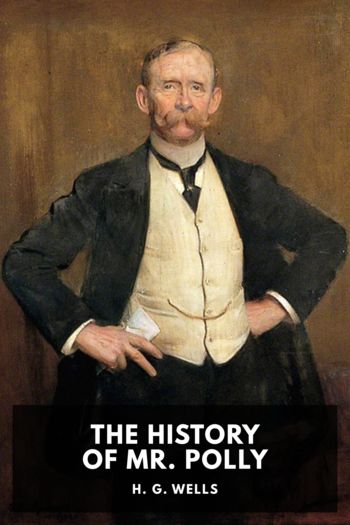The History of Mr. Polly by H. G. Wells (online e reader TXT) 📕

- Author: H. G. Wells
Book online «The History of Mr. Polly by H. G. Wells (online e reader TXT) 📕». Author H. G. Wells
It was soon manifest the shop paid only in the least exacting sense, and Miriam did not conceal her opinion that he ought to bestir himself and “do things,” though what he was to do was hard to say. You see, when you have once sunken your capital in a shop you do not very easily get it out again. If customers will not come to you cheerfully and freely the law sets limits upon the compulsion you may exercise. You cannot pursue people about the streets of a watering place, compelling them either by threats or importunity to buy flannel trousers. Additional sources of income for a tradesman are not always easy to find. Wintershed at the bicycle and gramophone shop to the right, played the organ in the church, and Clamp of the toy shop was pew opener and so forth, Gambell, the greengrocer, waited at table and his wife cooked, and Carter, the watchmaker, left things to his wife while he went about the world winding clocks, but Mr. Polly had none of these arts, and wouldn’t, in spite of Miriam’s quietly persistent protests, get any other. And on summer evenings he would ride his bicycle about the country, and if he discovered a sale where there were books he would as often as not waste half the next day in going again to acquire a job lot of them haphazard, and bring them home tied about with a string, and hide them from Miriam under the counter in the shop. That is a heartbreaking thing for any wife with a serious investigatory turn of mind to discover. She was always thinking of burning these finds, but her natural turn for economy prevailed with her.
The books he read during those fifteen years! He read everything he got except theology, and as he read his little unsuccessful circumstances vanished and the wonder of life returned to him, the routine of reluctant getting up, opening shop, pretending to dust it with zest, breakfasting with a shop egg underdone or overdone or a herring raw or charred, and coffee made Miriam’s way and full of little particles, the return to the shop, the morning paper, the standing, standing at the door saying “How do!” to passersby, or getting a bit of gossip or watching unusual visitors, all these things vanished as the auditorium of a theatre vanishes when the stage is lit. He acquired hundreds of books at last, old dusty books, books with torn covers and broken covers, fat books whose backs were naked string and glue, an inimical litter to Miriam.
There was, for example, the voyages of La Perouse, with many careful, explicit woodcuts and the frankest revelations of the ways of the eighteenth century sailorman, homely, adventurous, drunken, incontinent and delightful, until he floated, smooth and slow, with all sails set and mirrored in the glassy water, until his head was full of the thought of shining kindly brown-skinned women, who smiled at him and wreathed his head with unfamiliar flowers. He had, too, a piece of a book about the lost palaces of Yucatan, those vast terraces buried in primordial forest, of whose makers there is now no human memory. With La Perouse he linked The Island Nights Entertainments, and it never palled upon him that in the dusky stabbing of the “Island of Voices” something poured over the stabber’s hands “like warm tea.” Queer incommunicable joy it is, the joy of the vivid phrase that turns the statement of the horridest fact to beauty!
And another book which had no beginning for him was the second volume of the Travels of the Abbés Hue and Gabet. He followed those two sweet souls from their lessons in Tibetan under Sandura the Bearded (who called them donkeys to their infinite benefit and stole their store of butter) through a hundred misadventures to the very heart of Lhassa, and it was a thirst in him that was never quenched to find the other volume and whence they came, and who in fact they were. He read Fenimore Cooper and Tom Cringle’s Log side by side with Joseph Conrad, and dreamt of the many-hued humanity of the East and West Indies until his heart ached to see those sun-soaked lands before he died. Conrad’s prose had a pleasure for him that he was never able to define, a peculiar deep coloured effect. He found too one day among a pile of soiled sixpenny books at Port Burdock, to which place he sometimes rode on his ageing bicycle, Bart Kennedy’s A Sailor Tramp, all written in livid jerks, and had forever after a kindlier and more understanding eye for every burly rough who slouched through Fishbourne High Street. Sterne he read with a wavering appreciation and some perplexity, but except for the Pickwick Papers, for some reason





Comments (0)